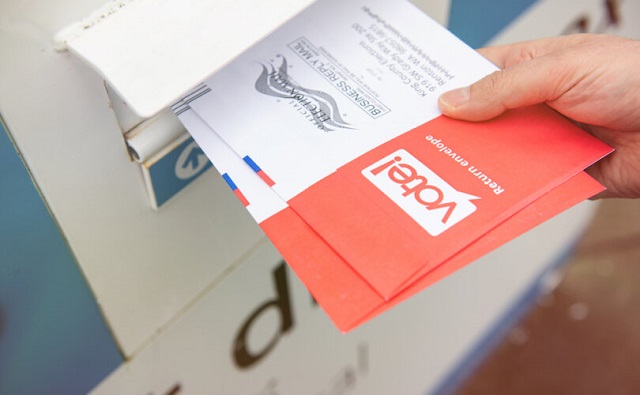Business
Trudeau’s labor minister pushes ‘equity’ mandate to favor LGBT job applicants

From LifeSiteNews
The report presented by Liberal Labour Minister Seamus O’Regan suggests giving special privileges to ‘LGBT-identifying and Black Canadians’ in the hiring process in the name of ‘equity,’ and dismisses concerns that such a move is tantamount to discrimination.
The Trudeau government is celebrating a newly proposed equity mandate which would reward LGBT-identifying job applicants over those with natural sexual proclivities.
On December 11, Liberal Labour Minister Seamus O’Regan announced the Employment Equity Act Review Task Force report, which seeks to add “LGBT-identifying and Black Canadians” to the list of those with special hiring privileges.
“It’s pretty historical,” O’Regan said outside the House of Commons foyer on Monday. “We are naming Black people and 2SLGBTQI+ individuals as designated groups under the Employment Equity Act.”
According to information obtained by the Canadian Broadcasting Corporation (CBC), the Liberal government, under the leadership of Prime Minister Justin Trudeau, “broadly supports” the recommendation.
The report, led by McGill University law professor Adelle Blackett, assured Canadians that it would not lead to “reverse discrimination” or abolish a merit-based hiring system, despite seemingly being formulated to do exactly that.
“Let us be clear: the Employment Equity Act framework does not impose quotas, and the notion of ‘reverse discrimination’ is not part of Canadian equality law and is likewise not part of the Canadian Employment Equity Act framework,” reads the introduction.
While the job candidates would still have to meet certain requirements to be considered for the position, they would not be competing against all candidates for the position but just those within their so-called minority group. As a result, they would have a higher chance of being hired for the position compared to someone who did not fit into the group.
The report dismissed this concern, however, labeling it as an American, not Canadian, argument. “The U.S. idea of ‘reverse discrimination’ has in particular gained a lot of attention. It is used so often in common parlance that many people do not recognize that it is not a part of Canadian substantive equality law,” reads the report.
The report also attempted to address the problem that because being an LGBT-identifying person is not an objective category, it is conceivable that people could just say they are members of the LGBT so-called community as a way to gain an advantage in the hiring process.
“Declarations of this nature… would constitute dishonesty in the employment relationship and although the threshold for dismissal on that basis is high, contextual factors to assessing the appropriate sanction would rationally include any preferential treatment received on the basis of the false statement,” the report said.
In recent years, there has been a push for in Canada, the United States and much of the West to go along with so-called “diversity, equity, & inclusion” (DEI) hiring and promotion practices.
The controversy surrounding DEI is that it usually goes hand-in-hand with a slew of identity-based social causes and grievances that undermine merit-based hiring, meaning that the most qualified person for a job may be overlooked in favor of someone of a particular skin color, ethnicity or sexual proclivity.
In 2019, the Canadian military was exposed for periodically closing all applications to the armed forces except to women if their so-called employment equity targets had not been met.
Similarly, in June 2023, Ontario announced free training for truck drivers; however, the offer was only extended to “women, newcomers and others from underrepresented groups,” effectively barring anyone except white, heterosexual men.
Additionally, this October, British Columbia construction companies were offered an extra cash incentive if they hire first-year apprentices who “self-identify” as LGBT, disabled, or anything other than a white heterosexual male.
Automotive
The EV ‘Bloodbath’ Arrives Early

 From the Daily Caller News Foundation
From the Daily Caller News Foundation
By David Blackmon
Ever since March 16, when presidential candidate Donald Trump created a controversy by predicting President Joe Biden’s efforts to force Americans to convert their lives to electric-vehicle (EV) lifestyles would end in a “bloodbath” for the U.S. auto industry, the industry’s own disastrous results have consistently proven him accurate.
The latest example came this week when Ford Motor Company reported that it had somehow managed to lose $132,000 per unit sold during Q1 2024 in its Model e EV division. The disastrous first quarter results follow the equally disastrous results for 2023, when the company said it lost $4.7 billion in Model e for the full 12-month period.
While the company has remained profitable overall thanks to strong demand for its legacy internal combustion SUV, pickup, and heavy vehicle models, the string of major losses in its EV line led the company to announce a shift in strategic vision in early April. Ford CEO Jim Farley said then that the company would delay the introduction of additional planned all-electric models and scale back production of current models like the F-150 Lightning pickup while refocusing efforts on introducing new hybrid models across its business line.
General Motors reported it had good overall Q1 results, but they were based on strong sales of its gas-powered SUV and truck models, not its EVs. GM is so gun-shy about reporting EV-specific results that it doesn’t break them out in its quarterly reports, so there is no way of knowing what the real bottom line amounts to from that part of the business. This is possibly a practice Ford should consider adopting.
After reporting its own disappointing Q1 results in which adjusted earnings collapsed by 48% and deliveries dropped by 20% from the previous quarter, Tesla announced it is laying off 10 percent of its global workforce, including 2,688 employees at its Austin plant, where its vaunted Cybertruck is manufactured. Since its introduction in November, the Cybertruck has been beset by buyer complaints ranging from breakdowns within minutes after taking delivery, to its $3,000 camping tent feature failing to deploy, to an incident in which one buyer complained his vehicle shut down for 5 hours after he failed to put the truck in “carwash mode” before running it through a local car wash.
Meanwhile, international auto rental company Hertz is now fire selling its own fleet of Teslas and other EV models in its efforts to salvage a little final value from what is turning out to be a disastrous EV gamble. In a giant fit of green virtue-signaling, the company invested whole hog into the Biden subsidy program in 2021 with a mass purchase of as many as 100,000 Teslas and 50,000 Polestar models, only to find that customer demand for renting electric cars was as tepid as demand to buy them outright. For its troubles, Hertz reported it had lost $392 million during Q1, attributing $195 million of the loss to its EV struggles. Hertz’s share price plummeted by about 20% on April 25, and was down by 55% for the year.
If all this financial carnage does not yet constitute a “bloodbath” for the U.S. EV sector, it is difficult to imagine what would. But wait: It really isn’t all that hard to imagine at all, is it? When he used that term back in March, Trump was referring not just to the ruinous Biden subsidy program, but also to plans by China to establish an EV-manufacturing beachhead in Mexico, from which it would be able to flood the U.S. market with its cheap but high-quality electric models. That would definitely cause an already disastrous domestic EV market to get even worse, wouldn’t it?
The bottom line here is that it is becoming obvious even to ardent EV fans that US consumer demand for EVs has reached a peak long before the industry and government expected it would.
It’s a bit of a perfect storm, one that rent-seeking company executives and obliging policymakers brought upon themselves. Given that this outcome was highly predictable, with so many warning that it was in fact inevitable, a reckoning from investors and corporate boards and voters will soon come due. It could become a bloodbath of its own, and perhaps it should.
David Blackmon is an energy writer and consultant based in Texas. He spent 40 years in the oil and gas business, where he specialized in public policy and communications.
Business
Honda deal latest episode of corporate welfare in Ontario

From the Fraser Institute
By Jake Fuss and Tegan Hill
If Honda, Volkswagen and Stellantis are unwilling to build their EV battery plants in Ontario without corporate welfare, that sends a strong signal that those projects make little economic sense.
On Thursday, the Trudeau and Ford governments announced they will dole out an estimated $5 billion in corporate welfare to Honda so the auto giant can build an electric vehicle (EV) battery plant and manufacture EVs in Ontario. This is the third such deal in Ontario, following similar corporate welfare handouts to Volkswagen ($13.2 billion) and Stellantis ($15.0 billion). Like the previous two deals, the Honda deal comes at a significant cost to taxpayers and will almost certainly fail to create widespread economic benefits for Ontarians.
The Trudeau and Ford governments finalized the Honda deal after more than a year of negotiations, with both governments promising direct incentives and tax credits. Of course, this isn’t free money. Taxpayers in Ontario and the rest of Canada will pay for this corporate welfare through their taxes.
Unfortunately, corporate welfare is nothing new. Governments in Canada have a long history of picking their favoured firms or industries and using a wide range of subsidies and other incentives to benefit those firms or industries selected for preferential treatment.
According to a recent study, the federal government spent $84.6 billion (adjusted for inflation) on business subsidies from 2007 to 2019 (the last pre-COVID year). Over the same period, provincial and local governments spent another $302.9 billion on business subsidies for their favoured firms and industries. (Notably, the study excludes other forms of government support such as loan guarantees, direct investments and regulatory privileges, so the total cost of corporate welfare during this period is actually much higher.)
Of course, when announcing the Honda deal, the Trudeau and Ford governments attempted to sell this latest example of corporate welfare as a way to create jobs. In reality, however, there’s little to no empirical evidence that corporate welfare creates jobs (on net) or produces widespread economic benefits.
Instead, these governments are simply picking winners and losers, shifting jobs and investment away from other firms and industries and circumventing the preferences of consumers and investors. If Honda, Volkswagen and Stellantis are unwilling to build their EV battery plants in Ontario without corporate welfare, that sends a strong signal that those projects make little economic sense.
Unfortunately, the Trudeau and Ford governments believe they know better than investors and entrepreneurs, so they’re using taxpayer money to allocate scarce resources—including labour—to their favoured projects and industries. Again, corporate welfare actually hinders economic growth, which Ontario and Canada desperately need, and often fails to produce jobs that would not otherwise have been created, while also requiring financial support from taxpayers.
It’s only a matter of time before other automakers ask for similar handouts from Ontario and the federal government. Indeed, after Volkswagen secured billions in federal subsidies, Stellantis stopped construction of an EV battery plant in Windsor until it received similar subsidies from the Trudeau government. Call it copycat corporate welfare.
Government handouts to corporations do not pave the path to economic success in Canada. To help foster widespread prosperity, governments should help create an environment where all businesses can succeed, rather than picking winners and losers on the backs of taxpayers.
Authors:
-

 Automotive1 day ago
Automotive1 day agoThe EV ‘Bloodbath’ Arrives Early
-

 CBDC Central Bank Digital Currency20 hours ago
CBDC Central Bank Digital Currency20 hours agoA Fed-Controlled Digital Dollar Could Mean The End Of Freedom
-

 Business2 days ago
Business2 days agoHonda deal latest episode of corporate welfare in Ontario
-

 espionage2 days ago
espionage2 days agoOne in five mail-in voters admitted to committing voter fraud during 2020 election: Rasmussen poll
-

 Frontier Centre for Public Policy16 hours ago
Frontier Centre for Public Policy16 hours agoHow much do today’s immigrants help Canada?
-

 Brownstone Institute19 hours ago
Brownstone Institute19 hours agoThe Numbers Favour Our Side









